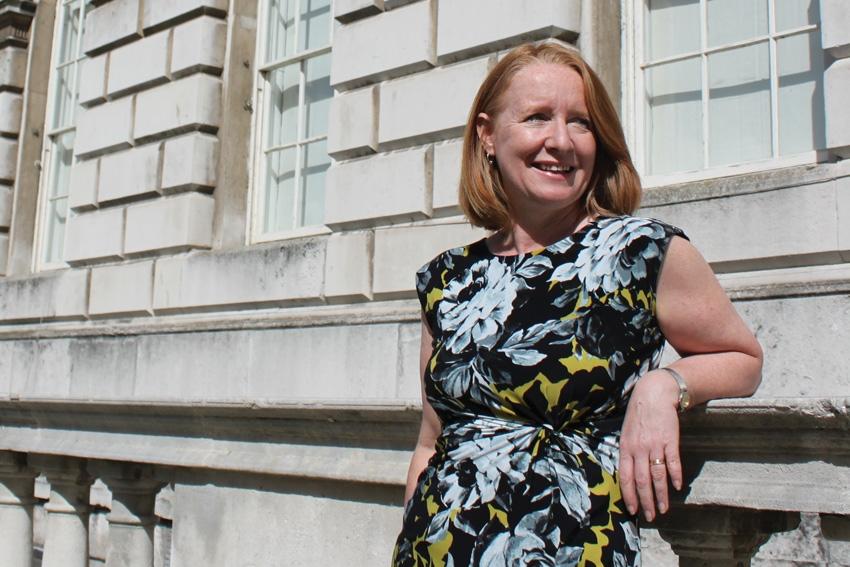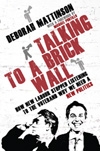Deborah Mattinson, co-founder of Opinion Leader Research, spent more than 20 years conducting and analysing focus groups for the Labour Party, working closely with Gordon Brown throughout the New Labour period. But the relationship came to what she calls “a sad end” last year as the party became increasingly unwilling to hear (or unable to stomach) what voters were saying.
In her new book, Talking to a Brick Wall, Mattinson uses focus group findings to tell the story of New Labour “through the eyes of the voter”, chronicling the breakdown of the relationship between politician and public from the 1980s right up to this year’s general election and Labour leadership contest.
Research: What made you decide to call your book Talking to a Brick Wall?
DM: Two reasons. One is that my observation would be that voters and politicians, rather than talking to each other and listening to each other, are now talking to a brick wall. It’s a two-way thing. Voters are not being heard by politicians. That then becomes a vicious circle because it means that politicians are talking a language that voters don’t understand and aren’t interested in.
“Politicians listen very hard when they want to be elected. They listen when they get answers they find it easy to deal with – they are much less keen on listening when they get tough answers back”
You say in the book that the gap between the Westminster village and everyone else has never been greater. Would you say that comes in spite of more effort than ever to close that gap?
No, I wouldn’t actually. I don’t think that there has been enough of an effort to close the gap. One of my conclusions in the book is that politicians listen very hard when they want to be elected. They listen when they get answers they find it easy to deal with – they are much less keen on listening when they get tough answers back. Throughout most of the time that I was involved, there was plenty of evidence flagging up problems and issues and things that politicians might think about. But where things were difficult to address, political leaders sometimes shied away from that. Just take expenses: my findings - and I reported them back to politicians – had told me for a long time that there was growing mistrust about what politicians actually did, how they were rewarded, what their motivations were. There were lots of opportunities to address that. It didn’t happen.
I think with any client-researcher relationship, for want of a better way of describing it, the person giving the advice can only give the advice. Politicians need to listen and they do also need to lead. You don’t slavishly follow what the focus group say they want to hear, but you have to understand where people are coming from in order to be able to justify your position. My position about all kinds of polling and research has always been that it’s an aid to decision-making, it shouldn’t make the decisions itself. Certainly one of the things you hear consistently in any focus group is that people want strong leaders.
You talk about having been anxious not to become too much a part of the Westminster village and instead stay on the outside looking in. Do you think you succeeded in doing that?
I don’t know if I succeeded completely because I think it’s impossible in some ways when you know a sector, an organisation or an interest very well. But I certainly tried to do it as much as I could. I was very aware that the Westminster village would be obsessing about a topic in a particular way and for the ordinary folk out there it might have completely passed them by or they might have a totally different take on it. I thought that was a huge problem. There was a point where I was under quite a lot of pressure to become a more integrated part of the team, and I could see why that might have worked in some ways, but I felt strongly that it was important to retain my otherness, and to have that degree of independence as I was interacting with voters.
One of the conclusions that I draw is that the disconnect between the Westminster village and the voter is not just the fault of politicians and the media. It is also to a certain extent the fault of the voter, who is happy in some ways to be infantalised by politicians, knows that they’re being sold a promise that probably can’t be delivered, and doesn’t question it too hard. The 2010 election is a really good example of that, where on the one hand people knew about the deficit and that it was a problem – on the other hand, did they want cuts? Did they heck. They knew that they couldn’t have their cake and eat it, but they weren’t prepared to challenge that very hard. I think there is a need for everybody to grow up here, for politicians to say, look, I can’t promise you the earth and deliver it without paying for it. But for voters to take that on board, too, to get a bit more involved and take a bit more of an interest.
How much faith do you have that that will happen?
I think this is potentially where participative democracy plays a role. I think if you say to people, you are going to vote on this as a referendum, I think that people do get more involved. We haven’t had that many referendums in this country but the evidence is that when it’s happened, people get more involved.
Did it concern you at any point that the work you were doing for Gordon Brown was becoming part of a power struggle between individuals?
I suppose what you’re getting at here is the ‘TB-GBs’ as they’re called. For an enormous amount of the time I was doing work for Gordon, and others were doing work for Tony, and there were, if you like, these different factions. In some ways the relationships, particularly the one between Gordon and Tony, were quite dysfunctional, but in some ways it was a very healthy tension, a very powerful and creative tension that worked very well, and that made the sum of the parts greater. Sometimes it was destructive, yes. I think the work I did on the whole was not part of that, but certainly there were times where my focus groups were being used against others. So Gordon would come in waving my notes, somebody else would come in waving somebody else’s notes. Why did I do it? I suppose because I felt I was right, the work I was doing was right.
“If the outtake from the focus group is simply reportage… it’s going to be hopeless. It’s about gleaning the insights and then thinking about how to apply them, and it’s not always straightforward”
A lot of your book is based on focus groups, a technique that you defend quite passionately. Why do you think there’s so much cynicism about them?
Possibly it’s partly because they have sometimes been misused, and therefore they’re an open target. I think it’s also because people don’t understand them. I’ve just come from a meeting where a prospective client said, “I’m worried about the number of focus groups that you’re proposing – how statistically reliable is that?” This was a very, very smart woman. I thought that was a really interesting example of complete misunderstanding of the methodology and what it can do. In my view focus groups are second to none in terms of what they try to do. But they are not a substitute for quantitative polling. And they’re certainly not a substitute for common sense or judgement. All those things have to be used together.
Do you think there’s a risk that focus groups encourage politicians to be led by whatever voters are saying that week, and not to stand for anything?
I don’t actually. At least, I don’t think it’s any more of a risk than it is in any other field where market research or social research is used. If anybody thinks that it can replace their own thinking, then they’re going to end up in trouble. It’s also about the quality of the product. If the outtake from the focus group is simply reportage, if somebody goes back and says, “They said this,” it’s going to be hopeless. It’s about gleaning the insights and then thinking about how to apply them, and it’s not always straightforward.
You stopped working for Labour last year. What are you working on now?
Viki Cooke and I left Chime earlier this year and have set up a new business called Britain Thinks, which will be trying to get under the skin of the contexts that our clients are operating in, in terms of the national mood, where ordinary members of the public are, and applying that to the business dilemmas that our clients have. We’ll be doing focus groups, we’ll be doing polling, we’ll also be wanting to set up and have people sponsor debates around some of the big issues of our time, issues that will affect commercial clients.
Would you work for Labour again?
Possibly. To be honest with you I’m enjoying looking at stuff from the outside at the moment. But you never say never, do you?
Deborah Mattinson’s book, Talking to a Brick Wall: How New Labour, stopped listening to the voter and why we need a new politics, is published by Biteback at £17.99








0 Comments